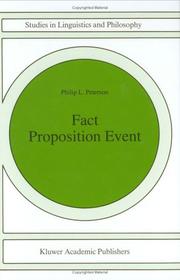| Listing 1 - 3 of 3 |
Sort by
|
Book
ISBN: 9789045027142 Year: 2015 Publisher: Amsterdam Antwerpen Contact
Abstract | Keywords | Export | Availability | Bookmark
 Loading...
Loading...Choose an application
- Reference Manager
- EndNote
- RefWorks (Direct export to RefWorks)
Tony Judts meesterwerk, Na de oorlog, gaat over de Europese geschiedenis na 1945. Maar de meest geruchtmakende stukken die Judt schreef, gingen over Israël en Palestina. Het was zijn bedoeling om over deze kwestie een boek te schrijven. Helaas werd die tijd hem niet gegund; in 2010 stierf hij aan ALS. Maar het materiaal lag er, en historicus Jennifer Homans - Judts weduwe - heeft de taak op zich genomen om er een boek van te maken. Wanneer de feiten veranderen is het resultaat. Het boek gaat over de manier waarop de gevolgen van de Tweede Wereldoorlog over de hele wereld een rol zijn blijven spelen. Met zijn enorme kennis, zijn visie en zijn bezieling schetst Judt een breed historisch beeld.
World history --- Facts (Philosophy) --- Faits (Philosophie) --- Feiten (Filosofie) --- Arab-Israeli Conflict --- History --- Zionism --- Israel

ISBN: 0801436869 9780801436864 Year: 2000 Publisher: Ithaca (N.Y.): Cornell university press,
Abstract | Keywords | Export | Availability | Bookmark
 Loading...
Loading...Choose an application
- Reference Manager
- EndNote
- RefWorks (Direct export to RefWorks)
Connaissance [Théorie de la ] --- Epistemologie --- Epistemology --- Epistémologie --- Facts (Philosophy) --- Faits (Philosophie) --- Feiten (Filosofie) --- Kenleer --- Kennisleer --- Kennistheorie --- Kentheorie --- Knowledge [Theory of ] --- Theorie of knowledge --- Theorievorming --- Théorie de la connaissance --- Curiosities and wonders --- Physical sciences --- Knowledge, Theory of --- Historiography --- England --- Great Britain --- Intellectual life --- History --- Knowledge, Theory of. --- Law and fact --- Historiography. --- History. --- Facts (Philosophy). --- Tudors, 1485-1603 --- Stuarts, 1603-1714 --- 16th century --- 18th century --- 17th century --- Curiosities and wonders - England - Historiography --- Physical sciences - England - Historiography --- England - Intellectual life - 17th century --- Great Britain - History - Tudors, 1485-1603 - Historiography --- Great Britain - History - Stuarts, 1603-1714 - Historiography --- England - Intellectual life - 18th century

ISBN: 0792345681 9048148561 9401589593 Year: 1997 Volume: 66 Publisher: Dordrecht ; Boston ; London Kluwer academic publishers
Abstract | Keywords | Export | Availability | Bookmark
 Loading...
Loading...Choose an application
- Reference Manager
- EndNote
- RefWorks (Direct export to RefWorks)
`Peterson is an authority of a philosophical and linguistic industry that began in the 1960s with Vendler's work on nominalization. Natural languages distinguish syntactically and semantically between various sorts of what might be called `gerundive entities' - events, processes, states of affairs, propositions, facts, ... all referred to by sentence nominals of various kinds. Philosophers have worried for millennia over the ontology of such things or `things', but until twenty years ago they ignored all the useful linguistic evidence. Vendler not only began to straighten out the distinctions, but pursued more specific and more interesting questions such as that of what entities the causality relation relates (events? facts?). And that of the objects of knowledge and belief. But Vendler's work was only a start and Peterson has continued the task from then until now, both philosophically and linguistically. Fact Proposition Event constitutes the state of the art regarding gerundive entities, defended in meticulous detail. Peterson's ontology features just facts, proposition, and events, carefully distinguished from each other. Among his more specific achievements are: a nice treatment of the linguist's distinction between `factive' and nonfactive constructions; a detailed theory of the subjects and objects of causation, which impinges nicely on action theory; an interesting argument that fact, proposition, events are innate ideas in humans; a theory of complex events (with implications for law and philosophy of law); and an overall picture of syntax and semantics of causal sentences and action sentences. Though Peterson does not pursue them here, there are clear and significant implications for the philosophy of science, in particular for our understanding of scientific causation, causal explanation and law likeness.' Professor William Lycan, University of North Carolina, Chapel Hill.
Philosophy of language --- Events (Philosophy) --- Evénements (Philosophie) --- Facts (Philosophy) --- Faits (Philosophie) --- Feiten (Filosofie) --- Gebeurtenissen (Filosofie) --- Logique des propositions --- Logique propositionnelle --- Propositie (Logica) --- Propositielogica --- Proposition (Logic) --- Proposition (Logique) --- Propositions [Logique des ] --- Language and languages --- Langage et langues --- Evénement (Philosophie) --- Philosophy --- Philosophie --- Philosophy. --- Events (Philosophy). --- Facts (Philosophy). --- Proposition (Logic). --- Evénement (Philosophie) --- Language and logic --- Logic --- Experience --- Semantics. --- Language and languages—Philosophy. --- Artificial intelligence. --- Philosophy of Language. --- Artificial Intelligence. --- AI (Artificial intelligence) --- Artificial thinking --- Electronic brains --- Intellectronics --- Intelligence, Artificial --- Intelligent machines --- Machine intelligence --- Thinking, Artificial --- Bionics --- Cognitive science --- Digital computer simulation --- Electronic data processing --- Logic machines --- Machine theory --- Self-organizing systems --- Simulation methods --- Fifth generation computers --- Neural computers --- Formal semantics --- Semasiology --- Semiology (Semantics) --- Comparative linguistics --- Information theory --- Lexicology --- Meaning (Psychology)
| Listing 1 - 3 of 3 |
Sort by
|

 Search
Search Feedback
Feedback About UniCat
About UniCat  Help
Help News
News